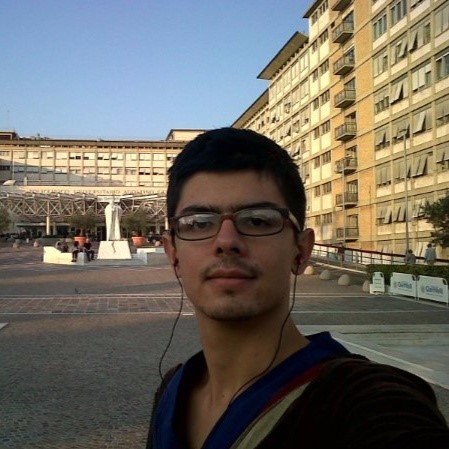|
|
Luka Ciklovan is currently an MA student with McGill's Department of Integrated Studies in Education. He is looking to conduct research on physical gaming spaces and the social relations and learning that permeate the gaming communities within them. His interest in Game Studies mainly stems from a desire to challenge the marginalizing discourses and stigmas surrounding games and gaming. He aims to enable youth to meaningfully tap into the knowledge and experiences that games contain, and to ultimately help teachers/researchers worldwide that are looking for concrete ways to design curricula or courses that integrate games into the classroom. In short, he considers himself an activist for the ethical treatment of games! (LinkedIn) |
|
|
Jeffrey L. Derevensky is James McGill Professor with the Department of Educational and Counselling Psychology at the Faculty of Education; Director of Clinical Training in School/Applied Child Psychology; Chair of the Department of Educational and Counselling Psychology; and Professor, Department of Psychiatry, at McGill University. He is currently the Director of the McGill University Youth Gambling Research and Treatment Clinic and the International Centre for Youth Gambling Problems and High-Risk Behaviors. Dr. Derevensky is on the editorial board of numerous scholarly journals and is a consultant to hospitals, school boards, gaming corporations and governments throughout the world. He is the author of over 200 published refereed peer-reviewed journal articles, 65 book chapters, and 3 books. He has been the recipient of multiple international research, clinical and training awards. Dr. Derevensky has testified before gambling commissions as an expert witness in North and South America, Europe, Asia and Australasia. He is considered an international expert in the field of gambling studies and behavioral addictions. He currently is a member of the World Health Organization’s international advisory committee studying gaming disorders. |
 |
Adam Dubé is an assistant professor in the Learning Sciences program with the Department of Educational and Counselling Psychology at the Faculty of Education and the Director of the Technology, Learning, and Cognition Lab. His work investigates how educational technology augments the learning process with a focus on educational video games. His work asks whether games are able to simultaneously entertain and educate? If so, how does learning within a game occur and does it change how the content is understood? For example, does the tactile nature of tablet educational games constitute a ‘hands-on’ interaction and is it a formative factor in tablet computer learning? |
|
|
Lindsay Duncan is an Assistant Professor in the Department of Kinesiology and Physical Education at McGill University. Her research draws from both social and health-psychological perspectives and concerns the effectiveness of messages designed to prevent risk behaviours and encourage health behaviors in adolescents and adults. She has a keen interest in a wide variety of behaviors including physical activity, healthy eating, smoking, substance use, and sexual risk behaviors. Recently her research has focused on developing and evaluating videogame interventions focused on behavior change, education, health, well-being, and social intelligence, using the most rigorous scientific methods and metrics available. In close partnership with researchers and videogame developers, she have developed four theory- and evidence-based videogame interventions for teens: PlayForward, which aims to reduce HIV transmission behaviours; smokeSCREEN v.1 and v.2, which focus on preventing cigarette and marijuana use; and OneNightStan which aims to empower young women regarding sexual encounters to reduce HIV risk. With funding from the International Olympic Committee she is currently developing a videogame intervention focused on preventing sport supplement abuse and doping among adolescent athletes. |
 |
Christian Ehret is an assistant professor in the Department of Integrated Studies in Education (DISE) with the Faculty of Education at McGill University. Professor Ehret investigates affective dimensions of writing, literacies, and digital culture through postqualitative, anthropological modes of inquiry, within and beyond schools. His research alongside youth and their videogame play has spanned multiple informal learning spaces, including community libraries and children’s hospitals. This research has described the social rhythms and affective support practices that youth generate alongside each other in the process of gaming for healing and for civic engagement. |
 |
Lea Ehret is a Ph.D student in DISE, studying female-led game writing/culture and the pedagogical potentials of inclusive game writing processes. |
 |
Manuela Ferrari is a Research Associate at the Douglas Mental Health University Institute in Montreal and an Adjunct Professor at School of Health Policy and Management, York University, Toronto. Dr. Ferrari received her doctoral degree in Health and Behavioral Sciences at the Dalla Lana School of Public Health, University of Toronto. As a Mitacs Post-Doctoral Fellow at McMaster University, Dr Ferrari worked with a video game company, Moonray Studios Inc., to help create Debris, a commercial video game aimed at overcome mental health stigma. She is interested in using game learning as a teaching strategy in professional development and continuing education training in the context of medical education as well as evaluating its impact on patient-clinician interactions and clinical competencies. She aims to assess the impact of participatory design and game learning in unpacking, exploring, and challenging health provider personals’ assumptions/biases as well as understanding the role of emotions in promoting learning and clinical competencies, and improve therapeutic relationships. |
 |
Susanne Lajoie is a Canadian Research Chair in Advanced Technologies for Learning in Authentic Settings in the Department of Educational and Counselling Psychology and a member of the Centre for Medical Education at McGill University. She is a Fellow of the American Psychological Association as well as the American Educational Research Association (AERA). She received the ACFAS Thérèse Gouin-Décarie Prize for Social Sciences along with the AERA-TICL Outstanding International Research Collaboration Award. Dr. Lajoie directs the Learning Environments Across Disciplines partnership grant funded by the Social Sciences and Humanities Research Counsel in Canada. She explores how theories of learning and affect can be used to guide the design of advanced technology rich learning environments in different domains, i.e. medicine, mathematics, history, etc. These environments serve as research platforms to study student engagement and problem solving in authentic settings. She uses a cognitive approach to identify learning trajectories that help novice learners become more skilled in specific areas and designs computer tools to enhance self-regulation, memory, and domain-specific learning. |
 |
Fanny Langin is an M.A student with McGill’s Department of Integrated Studies in Education. She is currently working on her master’s thesis about the effects of gamification on student satisfaction and knowledge retention in an online teaching setting. Fanny has gained practical experience with gamification and game-based learning through their use as a teacher and an online tutor and is now looking to expand her knowledge through research. Moreover, she is interested in creating original pedagogical content within the gaming context. (LinkedIn) |
 |
Néstor Nápoles López is a Ph.D. candidate in Music Technology at McGill University. Néstor works under the supervision of Professor Ichiro Fujinaga in the analysis of tonal music through machine learning models. Before attending McGill, Néstor graduated from an MSc in Sound and Music Computing from Universitat Pompeu Fabra, in Barcelona, where he worked in the automatic analysis of functional harmony. Nestor is originally from Guadalajara, Mexico, where he graduated from a Bachelor in Computer Science and a piano performance diploma. His interest in computer games started during his childhood, when he used to play many video games in the company of his older brother. Nowadays, as a research interest, Néstor attempts to design video games that can be used as pedagogical tools for music theory and musicianship. |
|
|
Justin Park is an entrepreneur that has experience to-date in youth development and education in Cameroon, South Korea and the U.S., working closely with at-risk youth as a Peace Corps volunteer and a Fulbright scholar. He is currently focused on providing support to the at-risk youth affected by substance abuse through games and gamification. He is a graduate of the Founder Institute, a Silicon Valley based global startup incubator. [Linkedin] |
 |
Juan Pimentel is a Colombian physician and epidemiologist. Currently, he is an assistant professor in family medicine and community health at La Sabana University, a researcher at the Research Group on Traditional Health Systems (El Rosario University, Colombia), and the head of Intercultural Medical Education at the Center for Intercultural Medical Studies (Colombian NGO). He is now pursuing a Ph.D. in Family Medicine to foster cultural safety in research and clinical practice through game-based learning in medical education. In particular, he is interested in Game-based learning research methods and participatory design in serious games. |
|
|
Margarida Romero is research director of the Laboratoire d’Innovation et Numérique pour l’Éducation (LINE), a research lab in the field of Technology Enhanced Learning (TEL). Full professor at Université Côte d'Azur (France) and associate professor at Université Laval (Canada). Her research is oriented towards the inclusive, humanistic and creative uses of technologies (co-design, game design and robotics) for the development of creativity, problem solving, collaboration and computational thinking. |
|
|
S M Hani Sadati started his PhD program in September 2015 at the Department of Integrated Studies in Education, Faculty of Education, McGill University. His doctoral project is on Participatory Digital Games to Address Gender-based Violence in ATVET Colleges in Ethiopia. This project is conducted under supervision of Professor Claudia Mitchell and co-supervision of Dr. Lisa Trimble. Hani’s background is in Social Science (BA) and Women Studies (MA) and his research interests include educational studies, game-based learning/gamification, women and gender studies, sexual health and HIV/AIDS, anthropology of health and illness, and participatory methodology. Hani is the Coordinator of the Games and Gamification for Human Development & Well-being (GHDW) Working Group. [Linkedin] |
 |
Sabrina Shajeen Alam is a Ph.D. candidate in the Technology, Learning, and Cognition Lab at Department of Educational & Counselling Psychology, McGill University. Her research interest is to find out the impact of educational technology on numerical understanding. Sabrina designed and developed a math app (Treasure Adventure: Numeracy) for elementary children with a focus on implementing the app as an intervention tool for children struggling with mathematics. Currently, she is investigating the effectiveness of the math app with a large-scale Southeast Asian population with her collaborator app developers. Sabrina has received many scholarships and awards for her academic excellence and also has presented her work in international conferences (i.e., APA, AERA, TMS, MCLS, Jean Piaget Society and others). |
|
|
Babak Shahmansouri is a researcher and social entrepreneur with over 10 years of experience. Babak initiated different educational programs such as: bringing systems thinking to schools through games and stores; promoting youth mental health through illustrated stories, mobile games and gamified workshops; and, teaching math to the visually impaired students. Babak studied MBA at Sharif University and educational leadership (MA) at McGill University. |
 |
Francesco Tordini is research business officer at the Centre for Interdisciplinary Research in Music Media and Technology (CIRMMT) housed at McGill University. His research interests lie at the intersection of computer engineering and auditory perception, with a focus on the use of sound in human-machine interaction, sonification, and serious games. Prior to McGill, he was R&D project manager and senior design engineer in the audio industry, with responsibility on sound quality evaluation and sound systems development for automotive and CE applications. [Linkedin] |
|
|
Run Wen is a PhD student in Technology, Learning, and Cognition Lab in Learning Sciences Program at Department of Educational & Counselling Psychology, McGill University. Her research interest lies at the values of digital games on education, with a focus on investigating how certain game features help to improve math attitudes. |
Department and University Information
Institute for Human Development and Well-Being
Faculty of Education#303, Duggan House
3740 McTavish
Montreal, Quebec H3A 1Y2
Tel.: 514-398-4527 Ext. 09990








